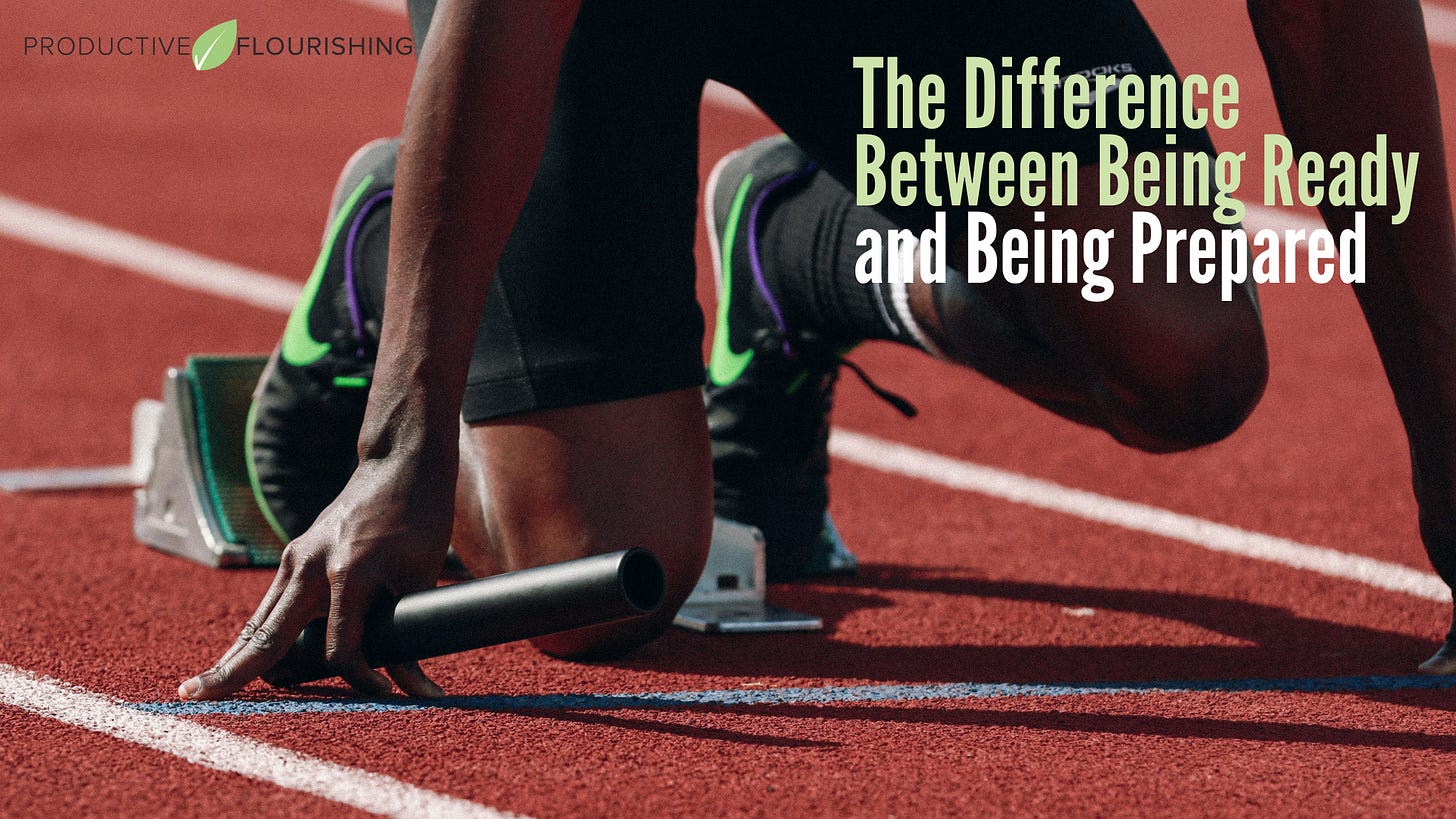The Difference Between Being Ready and Being Prepared
For what matters most, the best you can be is prepared. You may never be ready, but need to move forward anyway.
When we think about the next step to level up our work, our teams, or our business, we often think about if we are — or are not — ready for it, rather than if we are prepared for it. (Tip o’ the hat to Seth for drawing the prepared/ready distinction in Leap First.1)
When many people think of being ready, what they’re thinking about is being emotionally ready. You may think you aren’t ready for the level-up because you don’t have quite as much expertise as someone else who’s done it before, you haven’t been in the game long enough, or you’ll wait until next week, next month, or next quarter for… whatever reason you’ve come up with today.
Being prepared means that you’ve done the work, and you’re at the point where no more research and advice is going to tell you what to do. You can spend years, even decades, waiting to be ready and be in exactly the same spot for all of those years. You just have to have the courage to jump, and the faith in yourself to know that you can figure it out as you go.
Taking the Courageous Next Step
Having courage is one of the five keys I’ve discussed when overcoming your air sandwich. So when it comes to the concept of being ready vs. being prepared, being courageous is an important aspect to keep in mind.
Reminder: when you’re faced with different options or scenarios, ask yourself these two questions:
What’s the smartest next step?
What’s the most courageous next step?
When answering honestly, most people will have dramatically different answers. So when you’re deciding between the two options, choose the one that requires more courage. The world doesn’t need more people with great ideas, or more people with potential. The world needs people taking the more courageous next step.
That means that there may be a hard conversation (or two) that you don’t want to have, but the harder the conversation, the more you’ll know that it’s likely the courageous option and the one that is imperative for your growth. And once you know this, it makes it a lot harder to take the safer route.
Your People Know You’re Prepared
When you encounter a situation where you know that you’re truly prepared, then you may need to think about whose voice in your head is not letting you take that next step. Is it yours? Or is it someone else’s?
And then contrast that with what your yaysayers and success pack say and think. All too often, your success pack knows you’re prepared, and, in those places where you’re not, they’re prepared to help you.
While it’s not true 100% of the time, your success pack is usually right. When we think about the mission ahead, we often overweight our weaknesses and make them about our character, and underestimate our strengths and make them about luck. Your success pack sees more clearly that either the inverse is true or at least that the distribution is not so negatively weighted.
When in doubt, trust your success pack more than you trust your self-doubts.
Avoiding No-Win Scenarios
When we tell ourselves stories about why we aren’t ready, we need to be sure to avoid no-win scenarios. These are the situations where no matter what we do, we don’t win. That even if we do achieve success, in that success we will find pain. That pain that you fear may be that your success will cause burnout, that you’ll lose connection with your family, or that you’ll have to continually struggle to keep up the success.
So what do you do? You shoot for mediocrity. You don’t want to fail, but you don’t want to succeed, so you stay safe in the middle. This way, you don’t feel the pain of success or the pain of failure. While this may make sense in a particular moment from an emotional protection standpoint, over the course of your career or your life, this is where regrets come in. The times we just sat on the bench because we were too afraid.
You know in your heart where your edges are, so when you think about your activities day in and day out, and these no-win scenarios start to creep in, ask yourself, “What if?” and “Why not?” and “How can I make this possible?”. Prompting yourself this way will give you the grip to get away from these no-win scenarios.
What if you can do what you’re trying to do with joy, and without the pain?
How can you be successful in a way that brings you happiness, without continuous struggle?
The even deeper question that most of us aren’t ready to grapple with: in what ways is holding onto pain, struggle, failure, and perfectionism feeding stories we have about virtue and triumph?
We’re all afraid of failure, but when you think about it intellectually, what’s the worst that could happen?
You might fail, sure, but I’d hazard a guess you don’t have a track record of failing. You may have a track record of getting stuck in some things and crawling your way out, but not of failing. You’ve always been able to pick yourself up, brush yourself off, and go forward with the lessons you’ve learned and the new insight gleaned from trying something new.
No matter the outcome, having the courage to take that first step (ready or not!) is the only way to bring your best work into the world.
Affiliate link. Thanks for supporting PF!





